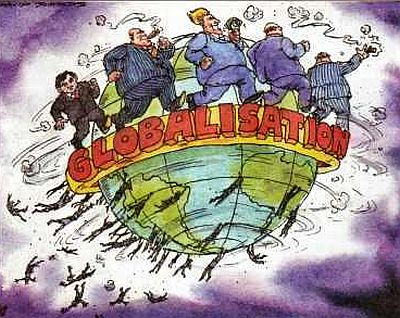The countries of Western capitalism will go into the technological lead, and in their footsteps followed by the most developed countries in South-East Asia
In 2009, the influential economist Mohamed El-Erian said that “the Third world is becoming the leading factor not only production (the status quo has evolved for a long time), but also consumption. As a result, it is in Third world countries will flow the major financial investment, skills, technology and innovation; the destiny of the Western countries in the foreseeable future – consistently low GDP growth, persistently high unemployment, rising commodity prices, stagnation in the market of securities (primarily common shares), and stagflation (stagnation plus inflation) caused by all the above factors.” This statement, due to various reasons, became the most popular meme among economists. But El-Erian was a welcome guest on business TV channels.
But after the outbreak last year, slowing China and sluggish growth in all other developing markets, but the steady growth of the US GDP around 2% per year and slightly above (2010-2,4%; 2011-1,8%; 2012-2,3%; 2013-1,5%; 2014-2,4%; 2015-2,6% – and it is with high base, let nothing outstanding in comparison with the previous growth rate of the U.S. in the twentieth century, but not disastrous compared to other economies in the world), it became clear that the statement of al-Arian, most likely, it does not scientifically justified a publicity stunt an economist who wants to attract attention. This PR stunt paid off: the fame the time has come, but really hurts now reputation hit lucky in the past Manager of the largest bond Fund RMSA.
But the management of funds is one thing, but making predictions about the future development of the world economy – is somewhat different. Because the ancient saying that making predictions about the future is an insult to the gods and there is no surer way to lose your reputation than to make a detailed prediction about the future development. And more than this prediction for the future, the surer you can be wrong.
Why wrong Mohamed El-Erian? The main reason behind his mistakes was that he tried to extrapolate the nature of past successful catch-up developing economies in the Third world for the future. Another reason is that as the current economist-practices (work in RMSO), probably a little familiar with the work of historians of Economics, he did not consider the endogenous nature of Western capitalism, and its high ability to recover.
I would not too harshly judge al-Arian. Forecasters had never really coped with their task, and now it is an extremely difficult task. The fact that the radical difference of the modern turbocapitalism from the previous stages, in that the complexity of capitalism increased by orders of magnitude. Now due to the extreme uncertainty of technological development, even approximately it is impossible to identify areas of growth. It is unfortunate that El-Erian continues not to understand. In the beginning of this year, he said, to return to growth, we need a new space program.
So I want to ask why he is again on the same rake, which “came” in 2009, making the prediction of the transition initiative in the economic development of developing countries? Indeed, in the 1950-ies, no one knew (and it was impossible to know) that it is the competition in space between the United States and the Soviet Union will lead to the creation of the us Agency DARPA, in which in 30 years will be created the Internet? Despite the fact that the space program itself after a couple of decades has been largely phased out in the US and the Soviet Union. The path of technological development is very non-linear.
And now we just don’t know what will be the next growth point in the global economy. No one could, for example, to anticipate the creation of Apple products such as iPod, iPhone, iPad. Rather, they existed in Hollywood films since the late 1960-ies, as a visionary project, but nobody believed that Steve jobs will take and you will do it. None of the big players could not take commercial risks create these revolutionary products. And jobs has taken these risks and succeeded.
And so almost everywhere in the new technological economy. The “shale revolution” was impossible to schedule, despite the fact that the technology of oil and gas production from shale is quite old (the Russian it is known from the 1960-ies, but they didn’t bother her any scale to apply). But the audacity of George Mitchell, his non-conformism, let him despite all the predictions to do it. The factor of good luck (for the implementation of commercially successful technologies have been hundreds and thousands of technological mikrotabletki, previously unknown). And now it’s almost the main reason American manufacturing insourcing (insoursing – the return of American companies in the home from South-East Asia) and the future of U.S. economic growth in the twenty-first century.
If El-Erian were better acquainted with the work of historians of Economics E. Madison, R. Allen, J. Mokira, N. Rosenberg, E. Phelps, then he would have realized that the power of modern capitalism was based primarily on internal, inherent (endogenous) the human propensity in the West to the technological creativity that is missing in other regions of the world, which is only a copy in the production of technological products created in the West. Even deserves a surprise how often the world’s eminent economists, making predictions, are ignoring the achievements of economic history.
Since the nineteenth century, from the beginning of the cascade of the industrial revolution, no original technological product that was originally invented in the East, there developed, as an industrial sample, and embedded in global production. All known technological products that we know now in the world, invented in the cultural countries of the West. The history of a civilization known to the Western ascent of only the following areas of technical progress – China, India and the Islamic world. However, all the global technological advances of China have been associated with the activities of government officials (mandarins) and ended around the sixteenth century. The Arabs, in the XIII century, the former most developed region, and then completely forgot about its technological superiority and lost all interest in technology. And India, after the Arab conquest, suffered the same fate as the Arab world. And nowhere else, and never in the history of the world, we have not seen such interest in technology, the main driver of development and economic growth in the last 200 years, as in the West.
Why al-Arian suddenly occurred to me that now everything will be different”? It turns out that the global economic discourse for the past seven years revolves around the statement of the economist, not well prepared from the point of view of economic history. It does not honor the global expert community. Although common voice and were heard, but they were poorly distinguishable (for example, as the voice of Christopher Rapke, chief economist at Bank of Tokyo-Mitsubishi UFJ).
So what’s the economic world? The world is waiting for a further care into the technological lead countries of Western capitalism, which was “in the footsteps” followed by the most developed countries in South-East Asia – those who in the future will be able to establish copying of industrial designs, developed in the West. Something like this separation as it was in the first half of the nineteenth century.
It is my prediction? No, it is the extrapolation of stable trends of world economic development, which was formed 200 years ago. Western capitalism, as a cultural phenomenon, the ontological technology of the West, will continue its triumphal March around the world. Due to the fact that technological man of Western capitalism forged in Western civilization for centuries, it is unlikely for a short time in other regions and countries will be able to catch up massively in quality and attitude to work, especially technologically creative.
The fall of the USSR in 1991 and the current slowdown of China, the development of which was spent exclusively in the development of catching up with the West (not by chance lasting, and in that and in other case, approximately the same amount of time), is a clear proof that without the formation of a new man (a man who lives to work, and not Vice versa) and the formation of social institutions, in keeping with technological companies that make technological development is the most desired thing for people of this society, nothing positive for the development of technologies in the long term will not happen. Therefore, as said the Briton Rudyard Kipling: “the West will remain the West, and the East East. And never the TWAIN shall meet”. At least in the foreseeable historical period.
What to do in Ukraine in this regard? To recognize this fact as a given. In the present historical period of radical social change happens only as the result of centuries of sustainable development) we will not be able to challenge the West in technological development. What could we do that?
We can either include in the Western technological civilization is only a very small part of our society when a total archaism further the rest of society. Or you can try to suspend our technological degradation in the framework of the national industrial policy, which will in the medium term to solve certain tasks of economic development and to educate new people for whom the technological development in the future will become a natural way of social life, as it did in his time in the West. And most importantly, that these new people will be able to initiate the social fluctuations that in the distant future will form in Ukraine, the real creative class of technology entrepreneurs and artisans. From whom will depend the future of sustainable technological development of our country, and, consequently, economic growth. What we did not talk about current and future “Them El Ariani”.







